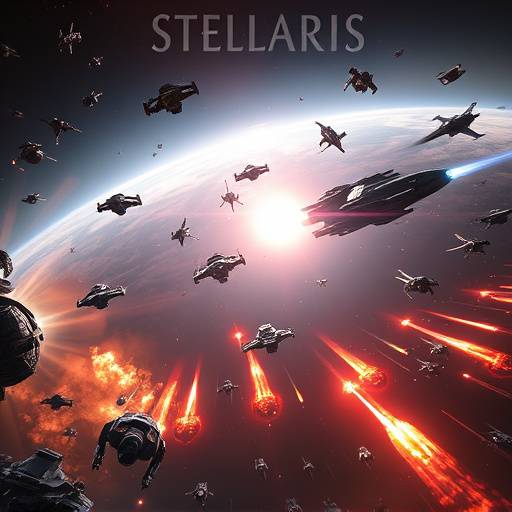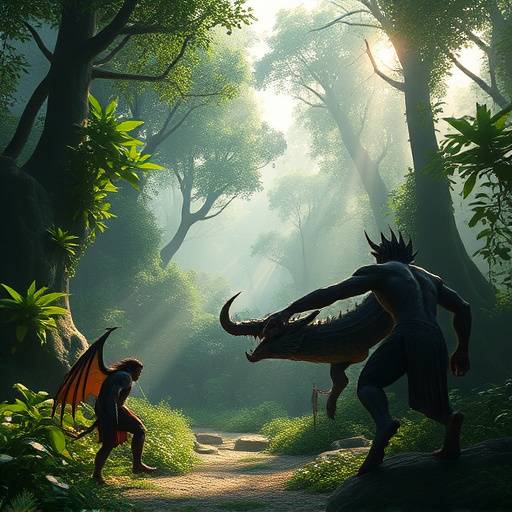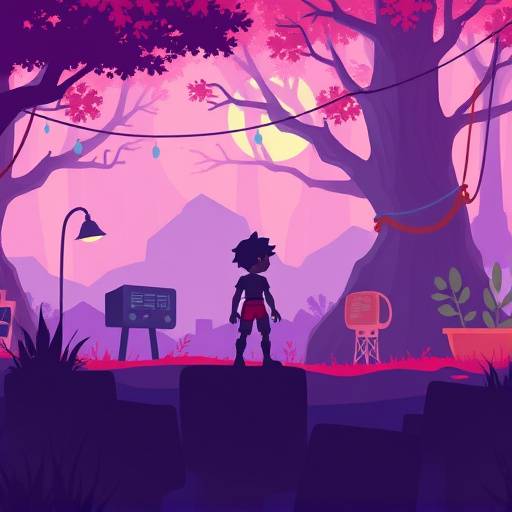Case Studies
Explore real-world examples of how AI is transforming the game development landscape. These case studies highlight the innovative ways developers are using AI to enhance gameplay, streamline production, and create more engaging experiences. Discover the strategies, challenges, and successes behind these projects, and learn how you can apply these techniques to your own game development endeavors.

Case Study: Stellar Conquest - AI-Driven Dynamic Diplomacy and Faction Behavior
Stellar Conquest, developed by Quantum Leaps Studios, a burgeoning game studio based in Bellevue, Washington, is a real-time strategy game that leverages AI to create a dynamic and unpredictable political landscape. One of the key challenges Quantum Leaps faced was making each playthrough feel unique and engaging. Their solution was to implement an AI system that governs the behaviors of the various alien factions within the game. This AI system uses a combination of behavior trees and machine learning to determine each faction's diplomatic stance, economic strategy, and military aggression.
The AI learns from player interactions and adjusts its behavior accordingly. For example, if the player consistently betrays alliances, the AI will make other factions more wary of forming agreements. This creates a more believable and challenging political environment. Furthermore, the AI utilizes procedural content generation to create unique faction backstories and objectives, ensuring that no two factions are exactly alike. According to lead designer, Dr. Aris Thorne, "The AI is not just about making the game harder; it's about making it more interesting and responsive. We want players to feel like they are truly shaping the galaxy through their actions." They can be reached at 206-555-0123 or info@quantumleapsstudios.com. Their studio address is 123 Main St, Bellevue, WA 98004.
Learn More About AI-Driven Game Design
Case Study: Neo City Nights - AI-Powered NPC Generation and Dialogue
Neo City Nights, developed by Lumina Studios, located in the heart of Los Angeles, California, is an open-world cyberpunk RPG that utilizes AI to generate unique and believable non-player characters (NPCs). One of the biggest challenges in creating a sprawling open-world game is populating it with characters that feel alive and dynamic. Lumina Studios addressed this challenge by implementing an AI system that generates NPC backstories, personalities, and dialogue on the fly.
The AI uses a large language model (LLM) trained on a dataset of cyberpunk literature, movies, and games to create coherent and engaging narratives for each NPC. When the player interacts with an NPC, the AI generates dialogue that is consistent with the NPC's backstory and personality. This allows for a much more immersive and believable experience. In addition, the AI also governs the NPCs' daily routines and behaviors, making them react realistically to the player's actions and the events happening in the game world. Elara Vance, the lead narrative designer at Lumina Studios, says, "AI allows us to create a city that truly feels alive, with characters that have their own stories to tell. It's a game-changer for immersion." Their LA based headquarters can be reached at +1 290-707-4591 or through their contact page. Address: 456 Hollywood Blvd, Los Angeles, CA 90028.
Explore AI Tools for NPC Generation
Case Study: Echoes of Aethelgard - AI for Adaptive Difficulty and Personalized Gameplay
Echoes of Aethelgard, created by Mythic Realms Studios, based out of Seattle, Washington, is a fantasy action RPG that employs AI to dynamically adjust the game's difficulty based on the player's skill level. Mythic Realms aimed to deliver a gaming experience that was equally enjoyable for seasoned RPG veterans and newcomers. To achieve this, they incorporated an AI system that monitors the player's performance and adjusts enemy AI, encounter design, and resource availability in real-time.
The AI analyzes a range of metrics, including the player's accuracy, reaction time, and resource management, to determine their skill level. If the player is struggling, the AI will weaken enemies, provide more healing items, and offer hints and tips. Conversely, if the player is excelling, the AI will make enemies more aggressive, reduce resource availability, and introduce new challenges. This creates a personalized gameplay experience that is tailored to the player's abilities. "We want every player to feel challenged and rewarded, regardless of their skill level," says Jian Li, the AI director at Mythic Realms Studios. "AI is the key to achieving this." To contact Mythic Realms Studios: 789 Innovation Way, Seattle, WA 98109, or contact them via support@mythicrealms.com. They also can be reached at (206) 555-1212.
Find Learning Resources for Adaptive AI
Case Study: Urban Genesis - AI-Powered Procedural City Generation
Urban Genesis, a city-building simulation developed by Skylark Games, based in Austin, Texas, utilizes AI to procedurally generate realistic and diverse urban landscapes. Skylark Games sought to create a city-building experience that was both aesthetically pleasing and strategically challenging. They implemented an AI system that generates city layouts, building designs, and infrastructure networks based on a set of rules and constraints.
The AI considers factors such as terrain, resource availability, and population density when generating the city. It also incorporates architectural styles and cultural influences to create unique and believable urban environments. The AI can generate a wide variety of city types, from sprawling metropolises to quaint coastal towns. Furthermore, the AI also dynamically adjusts the city's infrastructure and services based on the player's actions and the changing needs of the population. "AI allows us to create cities that are not only beautiful but also functional and dynamic," explains Anya Sharma, the CEO of Skylark Games. "It's a game-changer for the city-building genre." Skylark Games offices are located at: 10 Congress Ave, Austin, TX 78701. They can be reached at (512) 555-2323 or via email at info@skylarkgames.com.
Discover the Power of AI-Generated Art
Case Study: The Last Spark - AI-Assisted Animation and Indie Game Development
The Last Spark, an indie adventure game developed by solo developer, Kai Ito, of Tokyo, Japan, showcases the potential of AI-assisted animation for small-scale game projects. Ito, facing the constraints of limited resources, turned to AI animation tools to bring his vision to life. The core challenge was to create fluid and expressive character animations without the need for a large animation team. Using a combination of motion capture data and AI-driven interpolation techniques, Ito was able to drastically reduce the time and effort required for animation.
The AI tools automatically filled in the gaps between keyframes, generated realistic secondary motions, and even helped with facial expressions. This allowed Ito to focus on other aspects of game development, such as level design and narrative. The success of The Last Spark demonstrates that AI can empower indie developers to achieve high-quality results with limited resources. According to Ito, "AI animation was a game-changer for me. It allowed me to bring my characters to life in a way that wouldn't have been possible otherwise." Kai Ito can be reached via email at kai.ito@lastsparkgame.com, or via mail at 2-1-3 Shibuya, Shibuya-ku, Tokyo 150-8510, Japan.
Explore AI-Powered Animation Tools